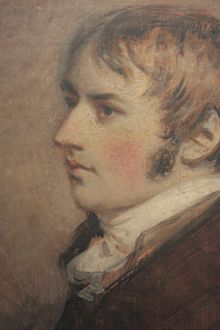John Constable | |
|---|---|
 John Constable by Daniel Gardner, 1796 | |
| Born | 11 June 1776 East Bergholt, Suffolk, England |
| Died | 31 March 1837 (aged 60) London, England |
| Resting place | St John-at-Hampstead, London |
| Nationality | British |
| Known for | Landscape painting |
| Notable work | The Hay Wain Dedham Vale |
| Movement | Romanticism |
John Constable RA (/ˈkʌnstəbəl, ˈkɒn-/;[1] 11 June 1776 – 31 March 1837) was an English landscape painter in the Romantic tradition. Born in Suffolk, he is known principally for revolutionising the genre of landscape painting[2] with his pictures of Dedham Vale, the area surrounding his home – now known as "Constable Country" – which he invested with an intensity of affection. "I should paint my own places best", he wrote to his friend John Fisher in 1821, "painting is but another word for feeling".[3]
Constable's most famous paintings include Wivenhoe Park (1816), Dedham Vale (1828) and The Hay Wain (1821).[4] Although his paintings are now among the most popular and valuable in British art, he was never financially successful. He was elected to the Royal Academy of Arts at the age of 52. His work was embraced in France, where he sold more than in his native England and inspired the Barbizon school.
- ^ "Constable, John," Random House Webster's Unabridged Dictionary
- ^ V&A: John Constable - an introduction
- ^ Parkinson 1998, p. 9
- ^ Constable’s Wivenhoe Park is widely recognized as an important work in the artist’s career. Archived 29 November 2014 at the Wayback Machine